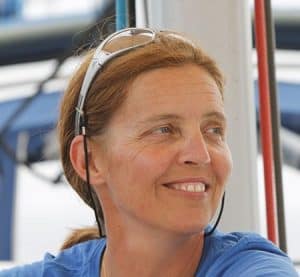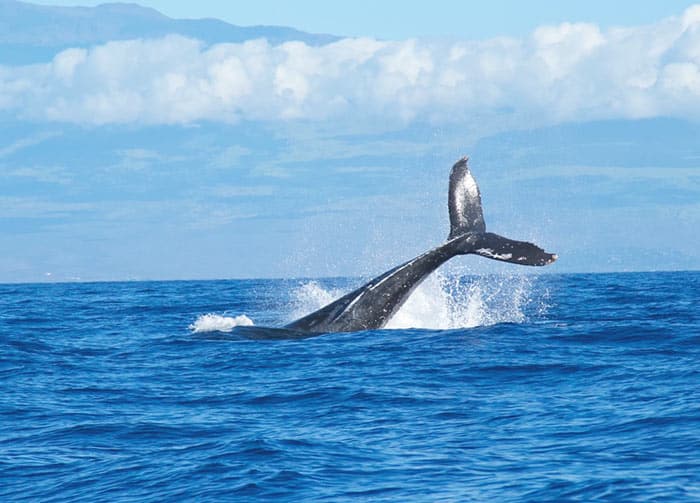
I can not say enough about the Plastic waste in the environment and oceans report. I therefore met with Silvia Frey from OceanCare to learn even more about existing projects in the fight against plastic waste in the oceans. The OceanCare team is based in Switzerland, more precisely in the city of Wädenswil. I am glad that she found time for an interview. Let's start right away!
Christoph: Hello Ms. Frey. Why don't you briefly introduce yourself and your team to our community? What makes OceanCare so special?
Silvia Frey: The OceanCare team consists of seven people who work in different areas such as international cooperation, science, public relations, communication and education (see Environmental protection in school). I myself have been working for OceanCare for 20 years and am responsible for the areas of science and education and supervise various field projects, among other things. Every person on our team is passionate about protecting the oceans and that is palpable!
Christoph: Which animals are you particularly committed to? Could you briefly explain to us why this commitment is necessary at all?
Silvia Frey: OceanCare is committed to protecting the oceans and all their inhabitants. Whether marine mammals, fish, sea turtles or squid - their lives are now threatened by a variety of human impacts. Underwater noise, for example, makes it more difficult for them to communicate, locate prey and avoid enemies. Plastic waste is in the oceans ubiquitous and endangers marine life as they get caught in it or mistake plastic for food and perish. The chemical pollution of the oceans and the Overfishing are a serious threat to marine life.
Christoph: How does OceanCare manage to remove existing plastic waste from the ocean?
Silvia Frey: We promote clean-up campaigns in a wide variety of places, so-called Beach Cleanings. While removing plastic waste from the ocean and beaches is important, we must not overlook the fact that plastic is found everywhere in the ocean, including the deep sea, and therefore we cannot simply rid the oceans of plastic. In the final analysis, plastic pollution can only be sustainably reduced and prevented if we ensure that no more plastic waste enters the oceans. That is why OceanCare is also campaigning for Environmental Education on the subject, a change in the way plastic articles are handled, and improved legal framework conditions.
Christoph: That's great and a very good approach. What were your most formative experiences during your work with OceanCare?
Silvia Frey: The most impressive and formative experiences for me are always the encounters with marine life on the open sea. They give me courage, strength and confidence for the protection tasks that lie ahead. The sight of plastic waste on the surface of the water or on the beaches is also very formative. A sad legacy of our consumer society, which we must clean up quickly and without fail.
Christoph: Personally, I am very concerned. What are your expectations for the future of the oceans?
Silvia Frey: We also have to worry about the oceans, because their health is not good. However, it is important that concern does not make us incapable of action, because just doing nothing will certainly not bring about any improvement. We can all contribute to improvement through more conscious consumption of food, goods, and energy resources, handling waste, and treating marine life with respect. I deal with the threats to the oceans on a daily basis - despite this, or precisely because of this, I am convinced that it is not only high time to protect this habitat and its inhabitants, but that we can do so!
Christoph: I see it the same way! Many community members would like to be able to help out on site themselves. Is that possible and if so, how?
Silvia Frey: There are local beach cleaning activities at various destinations in which travel guests can also participate. It is therefore worthwhile to find out locally whether such activities are taking place. However, it is just as important to do something for a clean environment in the area where you live, for example by collecting litter in the forest or along rivers and lakes. It is amazing how much plastic waste is found in the process. Everything we collect can no longer get into the waterways and thus into the sea.
Christoph: This should motivate everyone to start cleaning actions themselves. How can each individual support OceanCare and other environmental projects for the common goal?
Silvia Frey: OceanCare is a non-profit marine conservation organization and relies on donations. We can only carry out our various projects because of the financial support of members and donors. The voice of every single person also counts when we launch petitions, for example, and thus want to achieve improvements at the legislative level to protect the oceans and their inhabitants.
Christoph: Thank you very much for your view of things and your great work. Continued success, we will surely run into each other again.
Epilogue to the interview with Silvia Frey of OceanCare:
I am very grateful to Silvia Frey for her time and commitment with OceanCare. It is always great to see that many people are committed to fighting plastic waste with great dedication. It is important to connect all environmentally conscious people to join forces in the fight against plastic waste in the environment. For this we have the worldwide Facebook group for Nature & Beach CleanUps has been launched. Anyone can share their clean-up activities here and get a pat on the back 🙂
Organizing a larger CleanUp also becomes easier with each additional member. Let's make a difference together!
Best regards,

PS: Do you already live plastic-free? If not, be sure to read the article Tips for a life without plastic through. Have fun!






